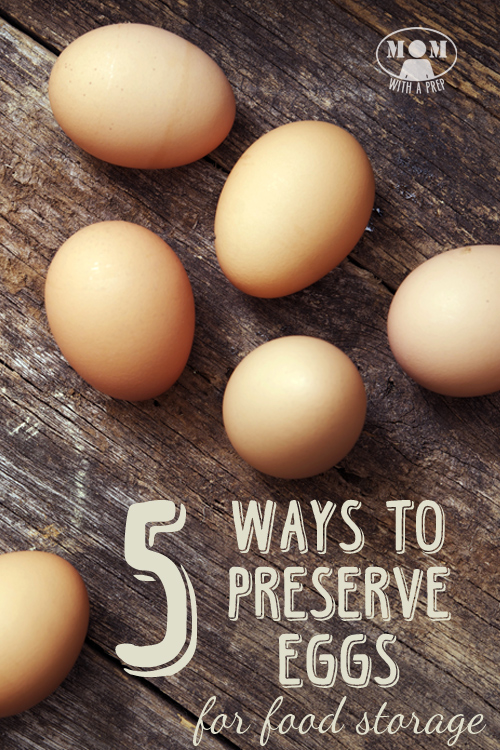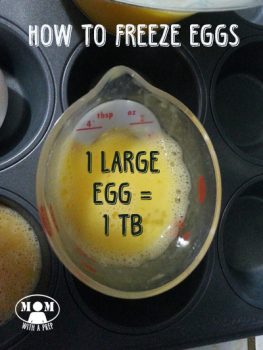Raising your own chickens and harvesting their eggs is one of the first steps people take to gain more control over their food. The thought of fresh farm eggs, even if you’re farm is only 1/4 of an acre, screams homesteader. It’s become one of the fastest movements of food revolution. But how can you preserve eggs more than just keeping them in the fridge?
With the recent bird flu epidemic wiping out thousands of egg laying chickens in commercial farms, the concern over where our eggs are coming from increase. With that outbreak, we’ve all watched our egg prices begin to increase dramatically. In some areas, a dozen eggs is over $5, and it’s not the fancy brands, nor is it expected to stop soon.
Even if you aren’t able to raise your own chickens in your backyard, you do have some options of being able to preserve and/or substitute to keep your egg costs down, while still being able to enjoy them.
If you’re worried, there are alternative places to buy eggs
Check local chicken people! Odds are you might have an egg supplier right in your own neighborhood who can sell you eggs, and they’d love to continue to do so even after the drama is over!
Check out local farmer’s markets. There are gatherings all over the country from small to commercial venues where local raisers can sell you some eggs that are raised locally.
Check at your local store. Many stores are beginning to sell locally raised eggs that wouldn’t have been effected by the bird flu OR a sharp increase in price just because they can.
Preserve Eggs by Freezing
You can learn more about the freezing process from my post on freezing eggs for food storage.
Remember, texture can change after an egg is thawed, and most folks will say that frozen eggs aren’t good for creating a breakfast on their own, but are great incorporated into dishes where they are no longer the star. Try it out for yourself, though!
Preserve Eggs by Dehydrating
This is one of those things that I have never done. I’ve never been comfortable with the process, never been assured how safe they are for the home (freeze dried eggs are a whole different ball game), and just have never bothered to try. However, there are folks out there who have, and here are a couple that I trust enough to share their way with you:
How to Dehydrate Eggs (or not) by The Prairie Homestead
How to Make Powedered Eggs by One Good Thing by Jillee
Now, the difference is…. dehydrating raw eggs vs dehydrating cooked eggs. With raw eggs, you have issues with where the eggs are sourced from, whether they are pasturized or not, and the risk of salmonella poisoning, etc. You run less risk with cooked eggs, but they aren’t as versatile as doing raw eggs.
Preserve Eggs in Mineral Oil
I first learned about this process watching Doomsday Preppers. I knew you could store fresh farm eggs on the counter without a problem, but eggs that were purchased from the store must be stored in the fridge (or processed as above and stored). There was a way to preserve your farm fresh eggs if you coated them in food-grade mineral oil, put them back into a container and let them sit. Who knew it could be that easy? But does it work? Check out Prepared-Housewives year long science experiment to see. However, you’ll want to read this information to see the ramifications of this method.
Because we don’t have ready access to farm eggs, I’ve never used this method. And I would worry about a petroleum product being used on my eggs. These are the two reasons I don’t use this method, but again, I’m providing the information for you so that you can make a sound decision that works best for your family.
I’ve been asked about using olive oil instead of mineral oil. I’m going to say no, because it’s less likely to coat in the same way, can go rancid, and may not provide the same kind of barrier. HOWEVER, I’m not experienced in this and haven’t been able to find reliable information to support it, so cannot recommend it to preserve eggs.
Preserving in Glass Water
I’m gonna put this caveat out. If sodium silicate is so dangerous to mess with, I’m not really sure I want to preserve MY family’s eggs in it, but I know me and know how big of a klutz I am! Also, the price of the preservative is pretty hefty. As BexarPrepper says in the video, this size is not already mixed with water, so you aren’t buying water.
Preserve Eggs by Pickling
I’ll be really honest, I’ve never tried to pickle eggs (I have a gross visual of the guy in Dances with Wolves digging into a jar full of pickled eggs and eating them and it just grossed me out. Besides, I’m not a fan of the taste of most pickled things. It’s something I need to overcome, but I’m not going to start with eggs, trust me!) and I don’t see me doing it anytime soon. BUT…it may be a preservation method that you’ll learn to love! Here are 4 ways to pickle eggs that you might want to try!
Preseve Eggs by Salting
Preserving eggs in salt is a technique that comes from China that preserves eggs outside of the shell in salt to use for cooking methods later. You crack open an egg into salt, preserve it in layers of salt and wine and let it sit for months. It’s intriguing and I know there are people doing it in the food industry commercially for restaurants, etc. On Hunter, Angler Gardener, Cook, he does it with egg yolks and adds it to noodles. Will this work for you? You’ll have to decide and give it a try.
Use Egg Substitutes for Baking
Powdered Eggs – While powdered eggs may not be the best at replacing scrambled eggs in a meal, in a pinch they can. They’re best used to replace eggs in recipes where they can blend in with the local crowd, if you know what I mean. You can get them here on Amazon or try any of the other food storage companies like Auguson farms, EmergencyEssentials, etc.
Flax Seed or Chia Seed – you can soak flax or chia seed in water to create a gelatinous ‘goo’ that is a good egg replacement specially for baked goods. Learn how I do it here. (you can get Flax Seed and/or Chia seed here)
Learn even more here:
Learn to Read Those Egg Carton Labels
Your thoughts: Have you tried any of the above methods of egg preservation? How were your results? What do you think about the texture of powdered eggs? Share your ideas with us!

Katy Willis is a writer, lifelong homesteader, and master herbalist, master gardener, and canine nutritionist. Katy is a preparedness expert and modern homesteader practicing everyday preparedness, sustainability, and a holistic lifestyle.
She knows how important it is to be prepared for whatever life throws at you, because you just never know what's coming. And preparedness helps you give your family the best chance to thrive in any situation.
Katy is passionate about living naturally, growing food, keeping livestock, foraging, and making and using herbal remedies. Katy is an experienced herbalist and a member of the CMA (Complementary Medical Association).
Her preparedness skills go beyond just being "ready", she's ready to survive the initial disaster, and thrive afterward, too. She grows 100% organic food on roughly 15 acres and raises goats, chickens, and ducks. She also lovingly tends her orchard, where she grows many different fruit trees. And, because she likes to know exactly what she's feeding her family, she's a seasoned from-scratch cook and gluten-free baker.
Katy teaches foraging and environmental education classes, too, including self-sufficient living, modern homesteading, seed saving, and organic vegetable gardening.
Katy helps others learn forgotten skills, including basic survival skills and self-reliance.
She's been published on sites such as MSN, Angi, Home Advisor, Family Handyman, Wealth of Geeks, Readers Digest, and more.



